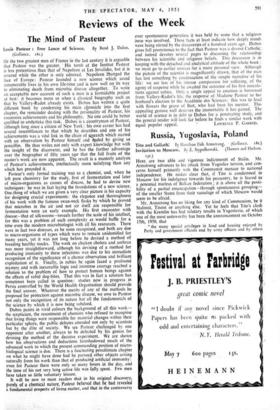Russia, Yugoslavia, Poland HERE are two able and vigorous indictments
of Stalin. Mr. Armstrong advances to his attack from Yugoslav terrain, and con- cerns himself primarily with the Communist menace to national independence. He makes clear that, if Tito is condemned in Moscow for his indulgence towards his peasantry, he is feared as a potential nucleus of Balkan federation ; it is above all the possi- bility of a partial emancipationâthrough spontaneous groupingâ of the smaller States from their vassalage of which Moscow would seem to be afraid.
Mr. Armstrong has no liking for any kind of Communism, be It Stalinist, Titoist or anything else. Yet he feels that Tito's clash with the Kremlin has had salutary results in Yugoslavia, of which one of the most noteworthy has been the announcement on October 15th, 1950, that " the many special privileges in food and housing enjoyed by Party and government officials and by army officers and by others of the ruling hierarchy were to be abolished. ... As a propaganda move, if nothing more, this was a master stroke. But actually it did
sewn to be more. No Communist regime had ever until now practised equality between the rulers and the ruled. If the decree of October 15th was lived up to, Tito would have set a standard for the ruling hierarchies of the Soviet Union and the satellite States that would embarrass them no end."
One can only wonder how the general public in the U.S.S.R. is ever either to know or be convinced of the sincerity of Tito's declara- tion. Further, in so far as Tito succeeds in appealing " from the practice of Stalin to the theory of Lenin," is he not likely to enhance the fundamental attractions of Communism ?
Mr. Stypulkowski is a Polish patriot with all that that implies. Since, ideologies apart, Pales and Russians have long felt themselves to be as incompatible as, say, Hungarians and Roumanians, his general attack upon Russia has become sufficiently familiar. It may, moreover, be weakened for some of his readers by his claim for pre-war Poland of a fully Western civilisation which she could not have possessed. It is really not exact that oppositional parties had real liberty of action between the wars. if one went to see General Sikorski in 1937 one found him under house-arrest because he opposed the pro-German and anti-Czech policy of the Colonels ; Neville Chamberlain never thought of subjecting Mr. Churchill or Mr. Harold Nicolson to such treatment.
peAs a first-hand account of the magnificent resistance of the Poles to the Germans, Mr. Stypulkowski's book has, however, obvious value, while, as a first-hand account of the experiences of a political prisoner in the Lubianka, it is unique. As Mr. Trevor-Roper writes in his preface, " the great Bolshevik treason trials . . . by their portentous regularity, their extraordinary human responses . . . invest their grotesque injustice with some of the liturgical imperson- ality of the Holy Office in the days of the Counter-Reformation." Mr. Stypulkowski was one of the sixteen Polish politicians who were invited to Moscow in the spring of 1945 and then abruptly thrown into prison ; the other fifteen were gradually induced to declare themselves traitors to the U.S.S.R. Only Mr. Stypulkowski resisted (for more than two months) the process of interrogation without direct physical torture. His account of the experience makes it rfectly intelligible that men will confess to anything before Soviet Judges.
" The commissars in the Lubianka have . . . three main aims .... First they try to get to know the prisoner and to assess his intelli- gence, character and powers of resistance as well as his weaknesses and ambitions. Secondly they try to . . . weaken his spirit by causing continual changes between the extremes of hope and despair. Thirdly, and this is probably the most important stage, they try to destroy the instinct of self-preservation which is natural to every human being."
-'How, one wonders, was this technique developed ? In so primitive a country how is the subtle behaviour of a TichonovâMr. Stypul- kowski's interrogatorâpossible ? Is it all of darkly ancient origin with a few modern additions such as the strong electric bulbs to keep the prisoners awake and under strain ?
ELIZABETH WISKEMANN.



































 Previous page
Previous page